From STK to TRSM: Meet the new executive chef

Chef Tommy McHugh brings 20 years of culinary experience to the Ted Rogers School of Management.
Renowned Toronto Chef Tommy McHugh says he is ready to serve up knowledge – and some great food – for hospitality and tourism management students at the Ted Rogers School of Management (TRSM).
McHugh, who started work as executive chef at TRSM Jan. 20, has served as executive chef for all seven Il Fornello restaurants and most recently as executive chef at STK in Yorkville. He brings 20 years of culinary experience, which will greatly benefit hospitality students and the broader TRSM community.
He’s worked with Joel Robuchon (voted best chef of the 20th century), was the sous chef at Nota Bene in Toronto, worked with Anton Mosimann (the Royal caterer to HRH Prince Charles) and worked at The Ivy Restaurant the year it was voted #8 restaurant in the world.
From his experiences in international and multi-concept dining in London, England, to working in Michelin-starred restaurants, five-star hotels and cafés across Europe and Canada – he’s ready to influence the next generation.
Here’s what he had to say about his new role at Ryerson.
Going from STK to TRSM is a big change. Can you tell me a little bit about why you took this opportunity and what will be some key differences?
Being able to have a teaching aspect and also being able to run a multi-unit kitchen is something that I enjoy. I like the challenge. I think the industry is changing quite rapidly from when I first entered the industry over 20 years ago now. It's a big change and I like the direction that Ryerson's going in. It has an amazing reputation within the industry. So, when this opportunity came up for me, it just seemed like a very natural fit. It’s ticking off all the boxes and it sounded like an amazing opportunity. So I thought, "You know what? This is something that I am definitely interested in."
What are you most excited about in this new role?
I do enjoy teaching and that comes from teaching staff that I'm working with in the kitchen. Our industry is an apprenticeship industry, right? It's all about the people that I trained with years ago who learned from somebody else and it goes all the way back to literally the 1700s in France. I'm at the point where it's now my responsibility to pass on my knowledge and my training to the next generation. And so for me, being able to do that in all the different outlets here at the university is something that I find most attractive.
It's kind of an amazing role where one day you come here, it's more of a traditional chef role and then the next day it's more of a teaching role. So I enjoy how it's always challenging and it's always interesting every day to come to work.
It’s only day one but what kind of menu changes can TRSM expect?
Because there are all these different sort of outlets between the kiosk and then the catering and then the classes twice a week with the lunch, I think it's a broad program and it's a broad spectrum, and I think the possibilities are essentially endless. So that keeps things interesting because there's not one specific direction or sort of niche. It's very open, and that keeps things exciting.
It’s still early days but whatever it is, it’s going to be delicious. I promise.
What would be your last meal?
For my last meal, I would definitely do butter chicken. Butter chicken and fresh naan from Motimahal on Gerrard Street.
How will your past experiences help hospitality students now?
I definitely entered the industry when it was very much traditionally structured. And with the changes that have come around, especially in the last 10 years, I've been part of it the entire way. So I very much know where the industry was, how it changed, where it is now, and where I feel it'll be going in the future.
So my goal is helping people, setting them up for success. It'll be about giving them all the information. Whether you do things in a high volume or more small fine dining setting, if you do things in a more traditional kitchen or more of a newer style kitchen, I can teach them all the best ways to succeed in all the different versions of the industry. And I think that’s something that is very useful because you never know what direction people want to go in. Some people want to go in something more like multi-units. Some people want to go into something more traditional. So being able to have the answers for whatever direction they want to go into, I think is the most useful thing that I can bring.
What are some of the changes in the industry you see coming and how will it impact students? Is there anything specifically you can see making waves?
That’s a good one. Sustainability I think is going to be the biggest thing. I think that people want to make sure that what they're eating is sustainable, is not causing damage or they're not eating, say something that is environmentally unfriendly. I think definitely things that are more plant-based is obviously something that's already here but I see it not so much as a trend, but something that will always stay. So I think if you can say to somebody, "Hey, we're using products that are local. They weren't grown on the other side of the world, put on a cargo boat, shipped over, or have a large carbon footprint,” and all these different things, I think it's better all around.